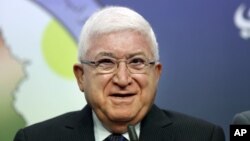The Iraqi parliament elected 76 year-old Kurdish lawmaker Fouad Massoum to be president Thursday, breaking a major political log-jam. Contentions remain, however, over who will fill the more important post of prime minister.
Kurdish lawmaker and Islamic legal scholar Fouad Massoum was elected president Thursday with a plurality of 211 votes in the second round of balloting. Rival Hussein Moussawi, who was not present, received only 17 votes.
Massoum succeeds President Jalal Talabani, who suffered a stroke last year and only just returned to Baghdad. Both men belong to the Patriotic Union of Kurdistan party.
The vote to elect Massoum took place after numerous procedural issues and attempts by various politicians to delay the election. One woman lawmaker demanded that Iraq's new president not be opposed to the death penalty, unlike outgoing President Talabani. Another insisted that Iraq's new president not hold dual citizenship.
Massoum took the oath of office in front of the head of Iraq's supreme court, repeating that he would carry out his legal duties with devotion, defending the independence and sovereignty of Iraq, protecting the interests of its people and its territory, its resources and its federalist, democratic system.
In a brief message to parliament after his election, Massoum thanked lawmakers for their confidence and vowed to protect the constitution. He went on to stress that he now faces major security, political and economic tasks. He asked for time to address parliament in the future to discuss what policies he plans to implement.
The vote came amid another day of violence in which more than 50 prisoners, being evacuated from Taji Prison, were killed in an attack by unknown assailants. No one claimed responsibility for the attack, but several Sunni politicians claimed that Shi'ite militias were behind the killings.
The election of a new president represented a positive step in the long process of breaking a lengthy political log-jam. Lawmakers must now select several vice presidents, before going on to the more momentous task of selecting a prime minister.
Outgoing Prime Minister Nouri al-Maliki refuses to give up his post, despite pleas from rivals and members of his own political bloc to do so. Maliki insists that he won more seats in this spring's parliamentary election and should be allowed to form a new government.
Middle East analyst Nadim Shehadi of Chatham House in London tells VOA that the political situation in Iraq remains a “mess,” but that things do appear to be moving forward:
“The system is - I won't say functioning - but at least it operates. So, there is still discussion, there's still compromise, (but) there are huge problems, of course. Eventually, what should happen in Iraq is that they should agree on a system of power sharing where all three main communities feel secure and don't feel that they're being marginalized," said Shehadi.
Shehadi went on to point out that the alternative, in the absence of a political consensus, was the break up of Iraq, but he said he did not think that is a “real option.”
Prime Minister Maliki also stressed, in a joint press conference with visiting U.N. Secretary-General Ban Ki-moon, that despite all of its problems, Iraq was moving forward with its political process, and had made considerable progress in moving towards democracy in the 11 years since the ouster of longtime president Saddam Hussein.








